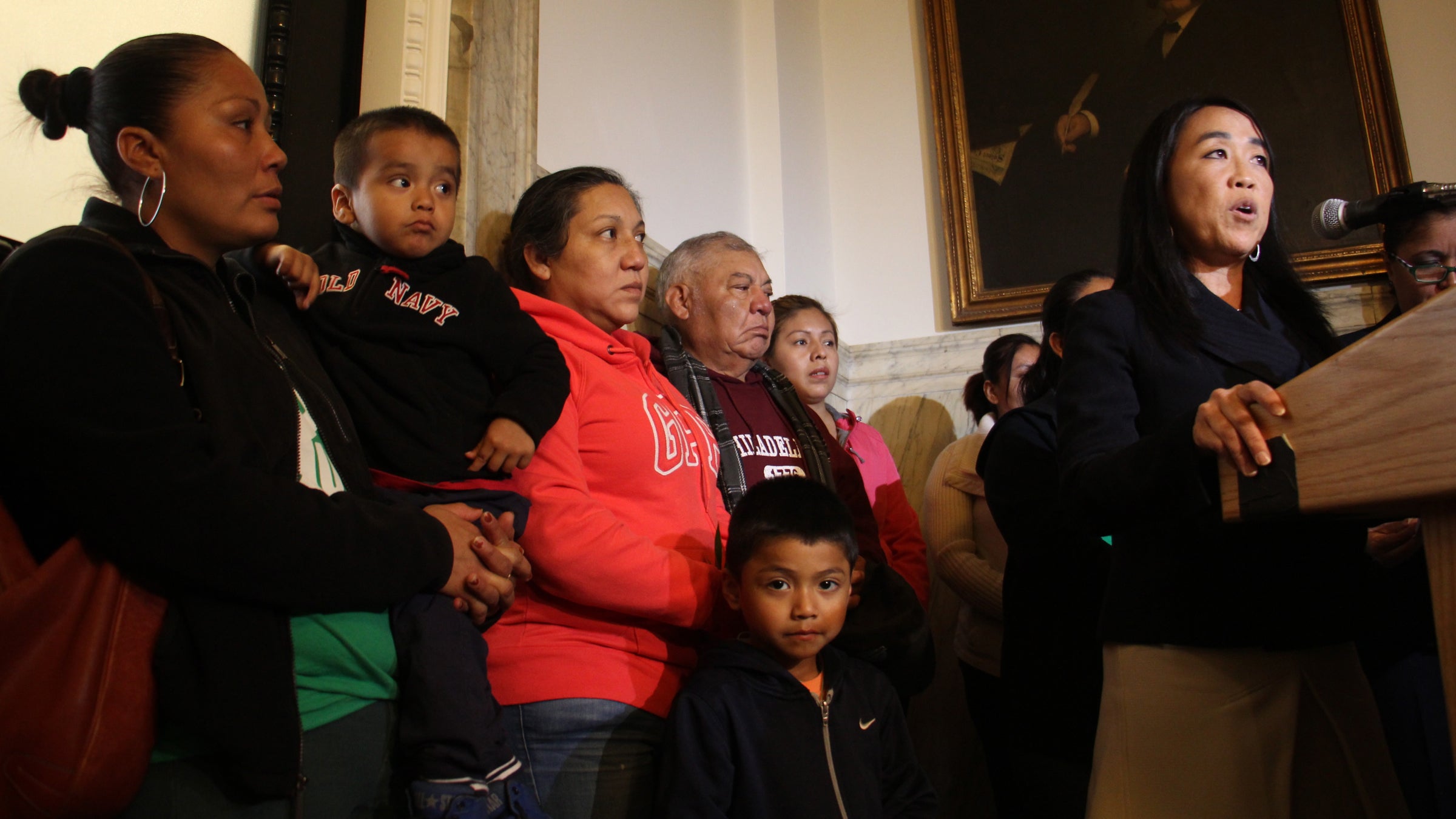Philly Councilwomen, immigrant-rights advocates urge Berks County detention center closure

Philadelphia Councilwoman Helen Gym (right) announces an urgent action appeal to the United Nations to end family detention at Berks and two other immigrant detention centers in the U.S. (Emma Lee/WHYY)
A coalition of immigrant-rights supporters appealed to the United Nations on Wednesday, asking the international peacekeeping organization to press American authorities to close three detention centers — including one in Berks County, Pennsylvania — where undocumented mothers and their children have been held, some for more than a year.
The “urgent action appeal” urges the U.N. to demand the U.S. government to end its controversial practice of family detention. Philadelphia City Councilwomen Helen Gym and Maria Quinones-Sanchez, several attorneys, and members of Juntos, a nonprofit that advocates for the immigrant community, announced the appeal in a morning news conference at City Hall.
“If the federal government cannot tell the difference between a child and a criminal, we have a big problem,” Gym said. “All the family detention centers need to be shut down. They’ve been deemed inhumane; they’re wholly inappropriate. The fact of the matter is ICE [U.S. Immigration and Customs Enforcement] is violating its own policies regularly and, frankly, with impunity. That‘s why we’re calling on intervention at the international level to take a look.”
The detention center in Berks County is one of three in the United States (the other two are in Texas) that hold about 1,700 undocumented immigrant mothers and their children, including some as young as infancy, in “secure facilities.” Critics say this amounts to imprisonment.
“Family detention is illegal, because it arbitrarily deprives families of liberty on no legal basis by measures that are neither necessary nor proportional to protect American interests,” said John Farrell, a student at Temple University’s Beasley School of Law who helped the coalition prepare its appeal. “International human rights standards are clear that deterring future migration is not a legal means to detain current migrants, and this is the reason that the Department of Homeland Security has claimed for its practice of detention.”
But Councilwoman Maria Quinones-Sanchez said revenge instead has fueled federal authorities’ crusade to keep the detention centers open.
“We think the federal government has the responsibility and the moral obligation to move on it immediately, and what they’re lacking right now is the political will to do that,” Quinones-Sanchez said. “I really believe that what’s happening in Berks is their way of getting back at Philadelphia and our position around our sanctuary cities. It’s a deliberate retaliation for everything we have fought for and stood for here.”
Farrell agreed: “The real reason that these families are being held in detention is as a means of punishment. The Department of Homeland Security’s own guidelines say that they should be held for a maximum of 20 days, and yet they have been held for over — in some cases — a year, with no indication of why or when they will be released.”
Adrian Smith, a spokesman for ICE’s Philadelphia office, defended the Berks center, saying it “has consistently met or exceeded rigorous state and agency operational directives. ICE has taken great care to ensure the center’s operations are fully transparent through regular facility access to all stakeholders. ICE ensures that the Berks center operates in an open environment and includes play rooms, social workers, resident field trips, educational services, and access to legal counsel. Comprehensive medical care is provided from the moment the families arrive and throughout their entire stay at the facility. Medical staffing for the residents includes registered nurses and licensed practical nurses, licensed mental health providers, mid-level providers that include a physician’s assistant and nurse practitioner, a physician, dental care, and access to 24-hour emergency care.”
Still, family detention has plenty of critics beyond Juntos.
Three members of the U.N.’s Working Group on Arbitrary Detention earlier this month toured the United States — including a family detention center in South Texas — and urged American authorities to abolish family detention and allow families to apply for asylum. The U.N. visitors especially objected to the detention of children, writing in a report issued Monday: “The detention of juvenile/minor migrants should be an exceptional measure and only be imposed as a measure of last resort and for the shortest period of time, taking into account their best interests.”
Even the Department of Homeland Security, which runs the family detention centers, doesn’t think it’s a good idea. In a Sept. 30 report, the department’s Advisory Committee on Family Residential Centers recommended ending family detention, unless authorities adopted its 166 pages of suggested improvements.
Pennsylvania has a thorny history with immigration issues.
“Pennsylvania has been ground zero for this international debate,” Quinones-Sanchez said. “We started with Hazleton. We are the state where English-only, anti-immigration legislation is debated every single day, and the city of Philadelphia has been singled out by the federal government for its posture and position in protecting our sanctuary cities.”
WHYY is your source for fact-based, in-depth journalism and information. As a nonprofit organization, we rely on financial support from readers like you. Please give today.

